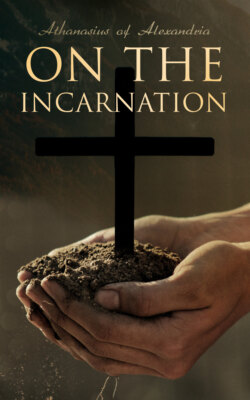Читать книгу On the Incarnation - Athanasius of Alexandria - Страница 11
На сайте Литреса книга снята с продажи.
§9.
ОглавлениеTable of Contents
The Word, since death alone could stay the plague, took a mortal body which, united with Him, should avail for all, and by partaking of His immortality stay the corruption of the Race. By being above all, He made His Flesh an offering for our souls; by being one with us all, he clothed us with immortality. Simile to illustrate this.
For the Word, perceiving that no otherwise could the corruption of men be undone save by death as a necessary condition, while it was impossible for the Word to suffer death, being immortal, and Son of the Father; to this end He takes to Himself a body capable of death, that it, by partaking of the Word Who is above all, might be worthy to die in the stead of all, and might, because of the Word which was come to dwell in it, remain incorruptible, and that thenceforth corruption might be stayed from all by the Grace of the Resurrection. Whence, by offering unto death the body He Himself had taken, as an offering and sacrifice free from any stain, straightway He put away death from all His peers by the offering of an equivalent. 2. For being over all, the Word of God naturally by offering His own temple and corporeal instrument for the life1 of all satisfied the debt by His death. And thus He, the incorruptible Son of God, being conjoined with all by a like nature, naturally clothed all with incorruption, by the promise of the resurrection. For the actual corruption in death has no longer holding-ground against men, by reason of the Word, which by His one body has come to dwell among them. 3. And like as2 when a great king has entered into some large city and taken up his abode in one of the houses there, such city is at all events held worthy of high honour, nor does any enemy or bandit any longer descend upon it and subject it; but, on the contrary, it is thought entitled to all care, because of the king ’s having taken up his residence in a single house there: so, too, has it been with the Monarch of all. 4. For now that He has come to our realm, and taken up his abode in one body among His peers, henceforth the whole conspiracy of the enemy against mankind is checked, and the corruption of death which before was prevailing against them is done away. For the race of men had gone to ruin, had not the Lord and Saviour of all, the Son of God, come among us to meet the end of death3.
Footnotes
1 ἀ ν τ ί ψ υ χ ο ν.
2 Possibly suggested by the practice of the emperors. Constantinople was thus dignified a few years later (326). For this simile compare Sermo Major de Fide, c. 6.
3 Or, “to put an end to death.”
